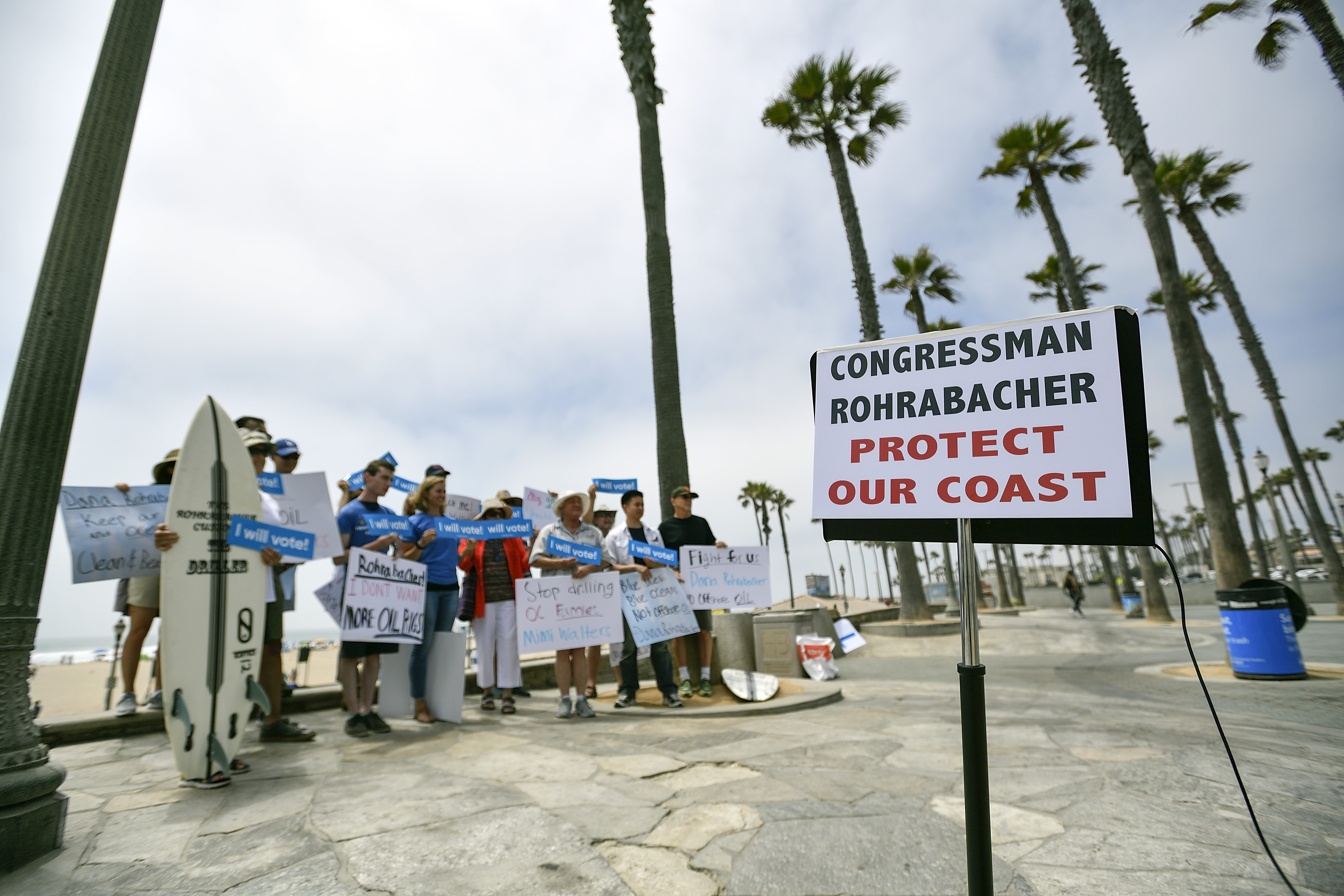Pressure to oppose new offshore oil drilling grows on GOP Congress members in Southern California
Despite recent polling showing the state’s voters strongly opposed to new offshore oil drilling, few Southern California’s GOP Congress members are speaking out against it.
Interior Secretary Ryan Zinke in January announced plans to offer 47 new drilling leases offshore of the West, East, Gulf and Alaska coasts.
After immediate and prompt opposition from Florida’s GOP House members, Zinke said that state would be removed from the list. But such unified opposition has not materialized among California’s Republican officials — even though many of their Republican constituents are against the proposal.
Newport Beach-based pollster Adam Probolsky surveyed three Southern California congressional districts held by Republicans and found that at least 56 percent of voters in each area wanted their representative to oppose more drilling off the state’s coast.
“If (GOP) Reps. Ed Royce, Duncan Hunter and Mimi Walters are looking for a mandate on offshore drilling, they don’t need to look any further than this,” Probolsky said of the poll, commissioned by the pro-environment Business Alliance for Protecting the Pacific Coast. “Voters in their districts value California beaches and coasts, and they want their elected officials to take action and make sure the Pacific remains protected.”
Additionally, the non-partisan Public Policy Institute of California released a poll this week that found 67 percent of voters statewide opposed new drilling. While 82 percent of Democrats and 66 percent of independents opposed the proposal, 40 percent of Republicans were also against it.
Opposition was also stronger along the south coast — 70 percent — than inland — 59 percent. The threat of oil spills and the visual impact of derricks are commonly cited by opponents to drilling.
The group that paid for the Probolsky poll is focusing on Royce, Hunter and Walters because it sees them as potential allies.

Meanwhile, Democratic activists are hoping to leverage the issue to wrest GOP congressional seats into Democratic hands, as seen by an anti-drilling demonstration Wednesday in Huntington Beach targeting Walters and fellow GOP House incumbent Dana Rohrabacher.
But the PPIC poll sheds doubt on whether that single issue could be a tipping point in the November elections, where virtually all the state’s Democratic House candidates have taken adamant positions against further drilling here.
Among environmental issues, water supply was named most often by Californians as their biggest concern (24 percent), followed by air pollution (15 percent), global warming (12 percent) and water pollution (8 percent).
Just 2 percent named oil drilling.
Oil company interest?
It’s unclear how interested oil companies are in new California leases, but state lawmakers are doing what they can to make offshore waters unattractive for more drilling.
Two pending state bills that would ban new pipelines in state waters to service new rigs in federal waters — SB-834 and AB-1775 — are advancing along party line votes, with at least one expected to become law.
New drilling is already banned in state waters, which extend three miles offshore. From 1981 to 2009, bipartisan congressional moratoriums prevented new leases in federal waters, which begin three miles offshore and extend out 200 miles.
The Zinke proposal would allow new leases, with a specific list of areas expected to be released after the November election, according to Richard Charter of the Ocean Foundation, which opposes new drilling. The administration would then complete environmental impact statements for those areas.
While the Trump administration can make the change without congressional approval, Zinke’s announcement to leave Florida off the list demonstrates the influence GOP lawmakers can have on the process. Additionally, Congress could pass legislation restricting new drilling, such as it did with the previous moratoriums.
Kevin Slagle of the Western States Petroleum Association, an oil company trade group, makes the case for increasing domestic oil production — but said companies “are not champing at the bit to pursue new offshore leases on the West Coast.”
Iraj Ershaghi, director of USC’s Petroleum Engineering Program, said there are 22 state regulatory agencies that would need to give their blessing before new drilling could take place.
“You can open leases but I don’t think there will be takers,” Ershaghi said.
But Charter thinks there is significant interest, and points to letters three companies have written Zinke detailing their desire to explore new sites off the state’s coast. On the other hand, he sees the pending state bills as deterrents.
“That could have a chilling effect on interest,” Charter said.
Where they stand
Here’s where key Republican Congress members from Southern California stand on new leases off the state’s coast, beginning with the most supportive.
- Rep. Dana Rohrabacher, R-Costa Mesa, supports opening up new leases, and says oil tankers arriving with imported oil are a risk for spills that would be reduced if there was more domestic oil.
- Rep. Steve Knight, R-Palmdale, supports an “all-of-the-above” approach in pursuing new energy sources, including new leases, according to campaign consultant Max Rexroad.
- Rep. Mimi Walters, R-Laguna Beach, signed a letter calling on Zinke to open new leases. But her campaign consultant, Dave Gilliard, says she opposes drilling off the state’s coast.
- Retiring Rep. Ed Royce, R-Yorba Linda, has not taken a public position and his office didn’t offer one when asked by the Southern California News Group. The Republican seeking his seat, Young Kim, doesn’t supporting drilling off the California coast but doesn’t oppose new leases elsewhere, according to Gilliard, who is also her consultant.
- Rep. Duncan Hunter, R-Lakeside, did not respond to requests for his position.
- Retiring Rep. Darrell Issa, R-Vista, has spoken out against opening up new leases. The Republican seeking his seat, Diane Harkey, doesn’t supporting drilling off the California coast but doesn’t oppose new leases elsewhere, according to Gilliard, who is also her consultant.
Democratic candidates in all six of these races oppose new offshore leases.













